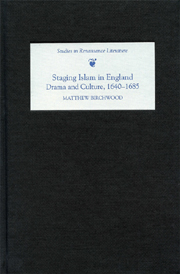Book contents
- Frontmatter
- Contents
- List of illustrations
- Acknowledgements
- Introduction
- 1 Cultural Encounters between England and Islam in the Seventeenth Century: A Topography
- 2 Framing ‘an English Alchoran’: The Famous Tragedie of Charles I and the first English translation of the Qur'an
- 3 Orienting the Monarch: Tyranny and Tragedy in Robert Baron's Mirza and John Denham's The Sophy
- 4 Turning to the Turk: Collaboration and Conversion in William Davenant's The Siege of Rhodes
- 5 Toleration, Trade and English Mahometanism in the Aftermath of Restoration
- 6 Plotting the Succession: Exclusion, Oates and the News from Vienna
- Conclusion: ‘If we our selves, would from our selves exam'ne us’
- Bibliography
- Index
- Studies in Renaissance Literature
5 - Toleration, Trade and English Mahometanism in the Aftermath of Restoration
Published online by Cambridge University Press: 12 September 2012
- Frontmatter
- Contents
- List of illustrations
- Acknowledgements
- Introduction
- 1 Cultural Encounters between England and Islam in the Seventeenth Century: A Topography
- 2 Framing ‘an English Alchoran’: The Famous Tragedie of Charles I and the first English translation of the Qur'an
- 3 Orienting the Monarch: Tyranny and Tragedy in Robert Baron's Mirza and John Denham's The Sophy
- 4 Turning to the Turk: Collaboration and Conversion in William Davenant's The Siege of Rhodes
- 5 Toleration, Trade and English Mahometanism in the Aftermath of Restoration
- 6 Plotting the Succession: Exclusion, Oates and the News from Vienna
- Conclusion: ‘If we our selves, would from our selves exam'ne us’
- Bibliography
- Index
- Studies in Renaissance Literature
Summary
IN THE LATE 1650s, William Davenant's experimental opera had reintroduced public theatre to Protectorate Britain and, in its revised and augmented form, would inaugurate the strand of heroic drama which, taken up by Dryden and his imitators, dominated the stage for the next twenty years. The Siege of Rhodes had portrayed an Ottoman sultan seemingly rehabilitated, reconciled with his Christian enemies in a final display of honourable co-exist-ence. This ‘Christian Turk’ appeared to embody the spirit of the earliest years of the Restoration, representative of the redemptive possibilities that a return to monarchy seemed to proffer in the early 1660s. At least, this is how the case is generally portrayed in the panegyric literature of the period. Charles' own declaration of intent, issued from Breda in April 1660, was itself painstakingly conciliatory. Not only did the new king promise to pardon retrospectively any ‘crime whatsoever committed against us or our royal father’ but also seemed to offer a balm to the religious discord that had contributed to the downfall of the previous Stuart government and which had only been exacerbated by the experience of civil war: ‘we do declare a liberty to tender consciences, and that no man shall be disquieted or called in question for differences of opinion in matter of religion which do not disturb the peace of the kingdom’. Such salving rhetoric is echoed, not only by Davenant's play, but to varying degrees, by the enthusiastic optimism of those ‘royalist’ poets who triumphantly serenaded the monarch's return.
- Type
- Chapter
- Information
- Staging Islam in EnglandDrama and Culture, 1640–1685, pp. 129 - 155Publisher: Boydell & BrewerPrint publication year: 2007



